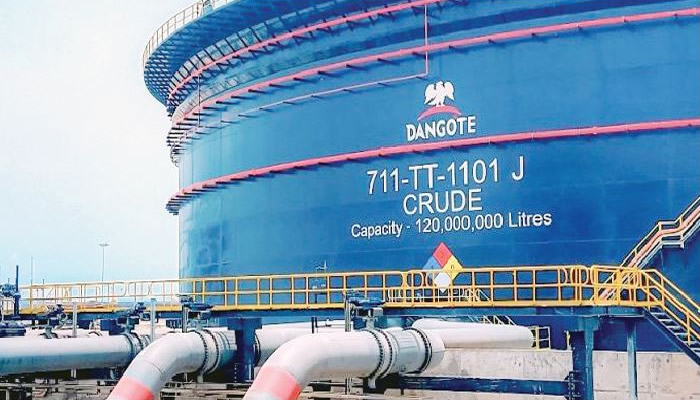The management of Dangote Refinery has redeployed a group of engineers recently dismissed following a dispute involving the Petroleum and Natural Gas Senior Staff Association of Nigeria (PENGASSAN) to other company projects located across states including Borno, Zamfara, and Cross River. The move comes amid efforts by the company to ease tensions and maintain operational stability following weeks of controversy surrounding staff disengagement at the refinery complex in Ibeju-Lekki, Lagos.
According to company sources, the redeployment was part of a broader restructuring plan aimed at ensuring optimal manpower utilization across Dangote Industries’ various energy and infrastructure projects. The decision, insiders said, was also intended to resolve ongoing friction with PENGASSAN and prevent a potential escalation that could disrupt the refinery’s expansion program.

The Dangote Petroleum Refinery, which began partial operations earlier this year, had reportedly terminated the contracts of some engineers after internal disagreements related to welfare, work schedules, and unionization rights. The development triggered intervention from the senior oil workers’ union, which accused the company of unfair labor practices.
In a statement issued over the weekend, the management clarified that no staff was wrongfully terminated and that the redeployment exercise was conducted in line with company policy. It added that the affected engineers were reassigned to other Dangote Group projects to support ongoing industrial and infrastructural development efforts across the country. “We have not dismissed any employee unfairly. Rather, we have redeployed certain staff to other facilities where their expertise is required. This is a normal business realignment to improve efficiency and support our growing operations,” the statement read.
The company further explained that the redeployment would allow engineers to contribute their technical expertise to projects in key northern states, including Borno and Zamfara, where Dangote Industries is undertaking new ventures in energy distribution, cement, and agricultural processing. Sources within the refinery revealed that some of the reassigned staff have already resumed at new project sites.
Meanwhile, PENGASSAN officials have insisted that the union’s engagement with the company is aimed at protecting workers’ rights and ensuring compliance with labor standards. The union, through its Lagos zone leadership, maintained that it was monitoring developments to ensure that redeployment did not serve as a disguised form of dismissal or retaliation against staff members advocating for improved working conditions.
Speaking anonymously, a union official said: “We have made it clear that workers must not be victimized for exercising their rights. Redeployment should not be used as a punitive measure. Our position is that all affected staff must be given fair treatment, adequate relocation support, and job security guarantees.”
Industry observers say the redeployment decision signals a pragmatic approach by the refinery’s management to resolve the lingering standoff without derailing production plans. The 650,000 barrels-per-day facility—Africa’s largest—has faced multiple labor and logistical challenges since the start of its operations. However, the company maintains that such issues are expected during the stabilization phase of a project of its magnitude.
A senior Dangote Group official, who spoke under anonymity, noted that the redeployment strategy is consistent with the company’s human capital management framework. “The refinery is only one part of our integrated industrial ecosystem. We have large-scale projects across multiple states, and it makes sense to optimize the deployment of our technical staff. The decision is in no way punitive—it’s about ensuring that skills are applied where they are needed most,” he said.
He also emphasized that the company continues to engage PENGASSAN and other stakeholders to ensure industrial harmony, noting that the management values its workforce and is committed to fair labor practices. “We are a responsible corporate organization. Our relationship with workers’ unions is important, and we are working to resolve all issues amicably,” he added.
The Ministry of Labour and Employment has reportedly been briefed on the matter, with officials expected to mediate ongoing discussions between Dangote management and PENGASSAN. Government sources confirmed that both parties have been encouraged to maintain open dialogue to prevent disruptions that could affect the refinery’s operations and broader downstream sector activities.
Analysts have described the situation as a test case for labor relations in Nigeria’s emerging private refining industry. The Dangote Refinery, which represents one of the largest private-sector investments in Africa’s oil and gas sector, employs thousands of engineers, technicians, and support staff, many of whom are members of professional unions. Experts argue that maintaining cordial labor relations will be key to ensuring the long-term sustainability of the multibillion-dollar facility.
The redeployment of the affected engineers, according to insiders, was also influenced by the company’s ongoing expansion efforts, which include plans to increase refining capacity to 1.4 million barrels per day in the coming years. Some of the relocated engineers are expected to assist in new construction and technical support roles in upcoming energy and fertilizer projects.
Despite initial tension, sources close to the negotiations said the move has helped reduce friction and restore relative calm among employees. Several workers who were part of the redeployment exercise reportedly expressed relief, noting that they would rather be transferred than face contract termination amid Nigeria’s tough labor market.
As the company and PENGASSAN continue discussions, observers believe the situation could set an important precedent for future labor-management engagements in the country’s downstream oil and gas sector. Dangote Refinery’s management, while reaffirming its commitment to fair labor practices, also restated its dedication to maintaining productivity and supporting Nigeria’s broader energy transition agenda.
With the redeployment now in motion, the company appears focused on stabilizing operations, rebuilding trust with its workforce, and sustaining its vision of becoming a global leader in refining and petrochemicals.
Support InfoStride News' Credible Journalism: Only credible journalism can guarantee a fair, accountable and transparent society, including democracy and government. It involves a lot of efforts and money. We need your support. Click here to Donate
